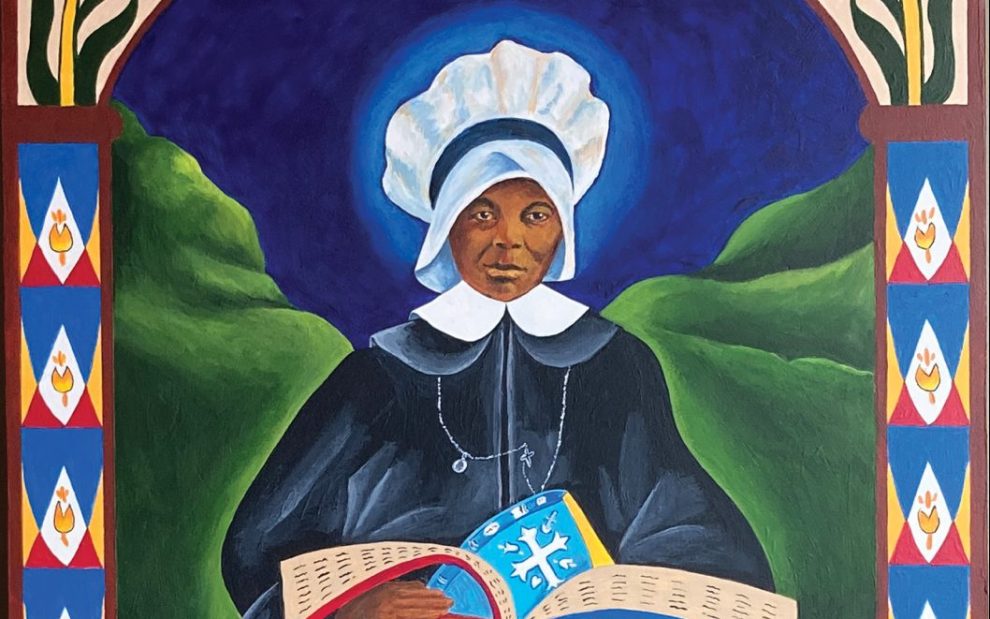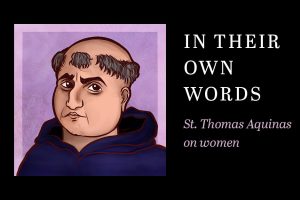By all accounts, Mother Mary Lange was a holy woman. She was also a revolutionary in every way that a visibly Black nun ministering in the slaveholding and racially segregated U.S. South and Roman Catholic Church could be during her pioneering tenure in religious life.
On September 20, 1835, Lange—then a 40- or 50-year-old consecrated religious living in Baltimore, Maryland, who could speak French and Spanish fluently—penned a letter to Father Louis Regis Deluol, the slaveholding superior of the Sulpician priests in the United States, accepting his request to have two members of her community assume the management of the domestic and infirmary duties at the nation’s first Catholic seminary in nearby Emmitsburg, Maryland.
Although her small community of nuns, called the Oblate Sisters of Providence, was a teaching order and descended from enslaved and free Catholics from the United States and the Caribbean, their subordinated status as poor Black women in America’s brutal slave society and the slaveholding Roman Catholic Church left them few options beyond accepting Deluol’s request.
Nonetheless, Lange courageously demanded recognition of her members’ consecrated status as women religious and protection as they prepared to undertake the perilous work among the slaver priests and priests-in-training at their historic Catholic settlement at Mount St. Mary.
“We do not conceal the difficulty of our situation,” Lange wrote. “As persons of color and religious at the same time . . . we wish to conciliate these two qualities in such a manner as not to appear too arrogant on the one hand and on the other, not to miss the respect which is due to the state we embraced and the holy habit which we have the honor to wear.”
Born in or around 1784 in Cuba to parents of African and Santo Dominguan descent, Lange had joined thousands of residents of the Caribbean islands who fled the bloodshed of the slave rebellion in Saint-Domingue (later Haiti) in the early 19th century and eventually settled in Baltimore’s growing French-speaking refugee population. The rebellion that became the Haitian Revolution produced the first republic free of slavery in the Western Hemisphere and laid the foundation for abolitionism throughout the Americas, but it would take another six decades before emancipation came to Lange’s adopted land of the United States. However, Lange did not let her new nation’s or her church’s defiant commitments to colonialism, slavery, and segregation prevent her from serving God and the abused and neglected populations of Maryland.
Indeed, when Father James Joubert, the French Sulpician priest who would serve as the male founder of the Oblate Sisters of Providence, first met Lange and her best friend, Marie Balas, they had been running a school for Black children out of Lange’s home. He also learned that the devout and pious women who had been active in Baltimore’s confraternities had vocations to religious life but suffered rejections on the basis of race from the diocese of Baltimore’s earliest European and white American sisterhoods, all of which were slaveholding orders.
Despite confronting the conspicuous limits of white mercy, charity, and decency in their slaveholding church in Baltimore, which also barred Black children from Catholic schools on the basis of color, Lange and the other three charter members of the Oblate Sisters of Providence refused to allow white Catholic commitments to white supremacy and exclusion prevent them from upholding their church’s most basic social teachings affirming the life and dignity of all people.
Unlike most of their counterparts, Lange and her Oblate sisters did not enslave people. They also did not employ racial or class barriers to admission into their congregation or their schools.
Although the existence of her community of Black sisters was deemed a “profanation of the habit” by members of Baltimore’s slaveholding clerical community, Lange transformed her school, soon called St. Frances Academy, into Baltimore’s first formal Catholic school open to Black children, free and enslaved. Her multiethnic and multilingual sisterhood also began preserving the vocations of other devout Black Catholic women who evidenced a revolutionary commitment to Black education and call to religious life in the slaveholding church.
In perhaps her most radical and loving move, Lange decided that her community would not accept the racist and sexist stigma that a woman born into slavery lacked the virtue necessary to enter religious life. Before abolition, the Oblate Sisters of Providence admitted into their ranks at least eight women born into slavery.
In the decades after Lange’s death on February 3, 1882, members of her community continued her trailblazing legacy of making a way out of no way in the face of unholy anti-Black and anti-Catholic discrimination.
Schools and orphanages established or administered by Lange’s Oblate Sisters of Providence were often the first or among the earliest Catholic institutions open to Black youth in those respective locales and served as safe havens for Black parents seeking a quality education and protection for their children under Jim Crow apartheid. Her Oblate Sisters of Providence—the first representatives of the church to teach and celebrate Black and Black Catholic history—also served as foot soldiers in some of the earliest and most important desegregation campaigns in the U.S. church, especially in Catholic higher education.
When Pope Francis formally decreed that Lange had lived a life of virtue and advanced her cause from servant of God to venerable on June 22, 2023, just three months after he repudiated the Doctrine of Discovery, which in the 15th century authorized European invasions of Africa and the Americas and facilitated the enslavement of millions of Africans and Native Americans, he officially linked Lange to the long Catholic struggle against the sin and scourge of white supremacy, misogynoir, and segregation in the modern church.
Lange’s extraordinary journey in our church illuminates the often-erased African foundations of American Catholicism, the transnational dimensions of African American Catholicism, and the central roles that Black women and girls played in the making of U.S. Catholicism—especially the tradition free from the most virulent aspects of white supremacy.
Lange and her Oblate Sisters of Providence thus also serve as the essential counterpoints to anyone who dares attempt to defend or excuse their slaveholding and segregationist peers, including recognized saints, as “people of their times.” Their story offers the searing reminder that Lange and her sisters were also people of those times.
That Lange was able to establish the modern world’s first Roman Catholic sisterhood freely open to African-descended women and girls in the slave society of the United States of America and the religious institution most responsible for the rise of African slavery in the Americas was the first miracle she performed.
That Lange’s Oblate Sisters of Providence and the countless beneficiaries of their labors have survived to see her declared venerable in the same year that the Vatican finally repudiated the Doctrine of Discovery is arguably the second miracle that can be attributed to her.
Indeed, if the world’s oldest Christian church, which once declared through its doctrine and practices of colonization, slavery, and segregation that Black and brown lives did not matter, can find a way to institutionalize the memory of a holy Black woman whose non-slaveholding order of Catholic sisters forced their church—through their “uncommon faithfulness” and ministries—to declare that the lives, souls, and futures of Black and brown people do matter, all is not yet lost.
Read more Wise Guides:
- Eileen Egan challenged church hierarchy behind the scenes
- Corita Kent, the joyous revolutionary
- Personal setbacks transformed St. Ignatius’ life for good
This article also appears in the January 2024 issue of U.S. Catholic (Vol. 89, No. 1, pages 45-46). Click here to subscribe to the magazine.
Image: Patricia Brintle. Commissioned by and installed at the Church of St. Francis Xavier.















Add comment